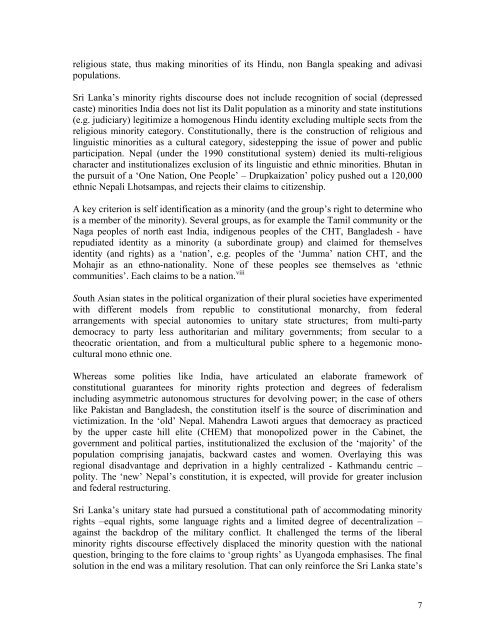Living on the Margins. Minorities in South Asia - EURAC
Living on the Margins. Minorities in South Asia - EURAC
Living on the Margins. Minorities in South Asia - EURAC
- TAGS
- minorities
- eurac
- www.eurac.edu
Create successful ePaper yourself
Turn your PDF publications into a flip-book with our unique Google optimized e-Paper software.
eligious state, thus mak<strong>in</strong>g m<strong>in</strong>orities of its H<strong>in</strong>du, n<strong>on</strong> Bangla speak<strong>in</strong>g and adivasi<br />
populati<strong>on</strong>s.<br />
Sri Lanka’s m<strong>in</strong>ority rights discourse does not <strong>in</strong>clude recogniti<strong>on</strong> of social (depressed<br />
caste) m<strong>in</strong>orities India does not list its Dalit populati<strong>on</strong> as a m<strong>in</strong>ority and state <strong>in</strong>stituti<strong>on</strong>s<br />
(e.g. judiciary) legitimize a homogenous H<strong>in</strong>du identity exclud<strong>in</strong>g multiple sects from <strong>the</strong><br />
religious m<strong>in</strong>ority category. C<strong>on</strong>stituti<strong>on</strong>ally, <strong>the</strong>re is <strong>the</strong> c<strong>on</strong>structi<strong>on</strong> of religious and<br />
l<strong>in</strong>guistic m<strong>in</strong>orities as a cultural category, sidestepp<strong>in</strong>g <strong>the</strong> issue of power and public<br />
participati<strong>on</strong>. Nepal (under <strong>the</strong> 1990 c<strong>on</strong>stituti<strong>on</strong>al system) denied its multi-religious<br />
character and <strong>in</strong>stituti<strong>on</strong>alizes exclusi<strong>on</strong> of its l<strong>in</strong>guistic and ethnic m<strong>in</strong>orities. Bhutan <strong>in</strong><br />
<strong>the</strong> pursuit of a ‘One Nati<strong>on</strong>, One People’ – Drupkaizati<strong>on</strong>’ policy pushed out a 120,000<br />
ethnic Nepali Lhotsampas, and rejects <strong>the</strong>ir claims to citizenship.<br />
A key criteri<strong>on</strong> is self identificati<strong>on</strong> as a m<strong>in</strong>ority (and <strong>the</strong> group’s right to determ<strong>in</strong>e who<br />
is a member of <strong>the</strong> m<strong>in</strong>ority). Several groups, as for example <strong>the</strong> Tamil community or <strong>the</strong><br />
Naga peoples of north east India, <strong>in</strong>digenous peoples of <strong>the</strong> CHT, Bangladesh - have<br />
repudiated identity as a m<strong>in</strong>ority (a subord<strong>in</strong>ate group) and claimed for <strong>the</strong>mselves<br />
identity (and rights) as a ‘nati<strong>on</strong>’, e.g. peoples of <strong>the</strong> ‘Jumma’ nati<strong>on</strong> CHT, and <strong>the</strong><br />
Mohajir as an ethno-nati<strong>on</strong>ality. N<strong>on</strong>e of <strong>the</strong>se peoples see <strong>the</strong>mselves as ‘ethnic<br />
communities’. Each claims to be a nati<strong>on</strong>. viii<br />
<strong>South</strong> <strong>Asia</strong>n states <strong>in</strong> <strong>the</strong> political organizati<strong>on</strong> of <strong>the</strong>ir plural societies have experimented<br />
with different models from republic to c<strong>on</strong>stituti<strong>on</strong>al m<strong>on</strong>archy, from federal<br />
arrangements with special aut<strong>on</strong>omies to unitary state structures; from multi-party<br />
democracy to party less authoritarian and military governments; from secular to a<br />
<strong>the</strong>ocratic orientati<strong>on</strong>, and from a multicultural public sphere to a hegem<strong>on</strong>ic m<strong>on</strong>ocultural<br />
m<strong>on</strong>o ethnic <strong>on</strong>e.<br />
Whereas some polities like India, have articulated an elaborate framework of<br />
c<strong>on</strong>stituti<strong>on</strong>al guarantees for m<strong>in</strong>ority rights protecti<strong>on</strong> and degrees of federalism<br />
<strong>in</strong>clud<strong>in</strong>g asymmetric aut<strong>on</strong>omous structures for devolv<strong>in</strong>g power; <strong>in</strong> <strong>the</strong> case of o<strong>the</strong>rs<br />
like Pakistan and Bangladesh, <strong>the</strong> c<strong>on</strong>stituti<strong>on</strong> itself is <strong>the</strong> source of discrim<strong>in</strong>ati<strong>on</strong> and<br />
victimizati<strong>on</strong>. In <strong>the</strong> ‘old’ Nepal. Mahendra Lawoti argues that democracy as practiced<br />
by <strong>the</strong> upper caste hill elite (CHEM) that m<strong>on</strong>opolized power <strong>in</strong> <strong>the</strong> Cab<strong>in</strong>et, <strong>the</strong><br />
government and political parties, <strong>in</strong>stituti<strong>on</strong>alized <strong>the</strong> exclusi<strong>on</strong> of <strong>the</strong> ‘majority’ of <strong>the</strong><br />
populati<strong>on</strong> compris<strong>in</strong>g janajatis, backward castes and women. Overlay<strong>in</strong>g this was<br />
regi<strong>on</strong>al disadvantage and deprivati<strong>on</strong> <strong>in</strong> a highly centralized - Kathmandu centric –<br />
polity. The ‘new’ Nepal’s c<strong>on</strong>stituti<strong>on</strong>, it is expected, will provide for greater <strong>in</strong>clusi<strong>on</strong><br />
and federal restructur<strong>in</strong>g.<br />
Sri Lanka’s unitary state had pursued a c<strong>on</strong>stituti<strong>on</strong>al path of accommodat<strong>in</strong>g m<strong>in</strong>ority<br />
rights –equal rights, some language rights and a limited degree of decentralizati<strong>on</strong> –<br />
aga<strong>in</strong>st <strong>the</strong> backdrop of <strong>the</strong> military c<strong>on</strong>flict. It challenged <strong>the</strong> terms of <strong>the</strong> liberal<br />
m<strong>in</strong>ority rights discourse effectively displaced <strong>the</strong> m<strong>in</strong>ority questi<strong>on</strong> with <strong>the</strong> nati<strong>on</strong>al<br />
questi<strong>on</strong>, br<strong>in</strong>g<strong>in</strong>g to <strong>the</strong> fore claims to ‘group rights’ as Uyangoda emphasises. The f<strong>in</strong>al<br />
soluti<strong>on</strong> <strong>in</strong> <strong>the</strong> end was a military resoluti<strong>on</strong>. That can <strong>on</strong>ly re<strong>in</strong>force <strong>the</strong> Sri Lanka state’s<br />
7

















